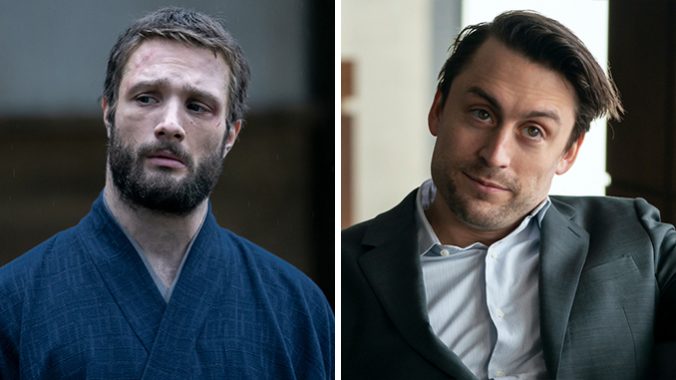Against All Odds, Shōgun Has Filled the Void Left by Succession
Photos Courtesy of FX and HBO
Initial reviews of Shōgun compared the 10-episode historical drama about the power struggle between warring factions in feudal Japan to HBO’s epic fantasy series Game of Thrones. It’s easy to understand why, what with the series’ period setting and numerous parties seeking to rule. But as the FX series based on James Clavell’s 1975 novel has progressed and we’ve gotten to better know the players and stakes involved, it’s clear that the show, which was adapted for TV by Rachel Kondo and Justin Marks, actually has more in common with another Emmy-winning HBO program: the dysfunctional family drama Succession.
Shōgun stars Cosmo Jarvis as Pilot Major John Blackthorne, an English sailor and protestant shipwrecked on the shores of Japan during a time of great political upheaval. With most of his crew dead or on the verge of starvation, Blackthorne is taken prisoner by Lord Yoshii Toranaga (Hiroyuki Sanada), a cunning war hero who finds the Englishman amusing but also believes he can use him and his naval knowledge as leverage in his fight for control of the country after its previous leader died before his heir was of age. Although a council of regents is in place, its foundation is being tested by the scheming Lord Ishido (Takehiro Hira), who plots with the other regents to impeach (and eventually kill) Toranaga, whom they believe to be too powerful.
With multiple factions fighting for control of the country, one can also easily see the connective tissue that exists between Shōgun and Succession. The tense backroom plotting and frequently shifting alliances are reminiscent of the meetings and secret deals that dominated Succession as the Roy siblings fought both each other and against outsiders for control of Waystar Royco, the multimedia conglomerate founded and run by their aging father. The damage inflicted years prior drives the grudges and decisions made by those today. But the similarities between the two series don’t end there.
Just as creator Jesse Armstrong infused comedy into nearly every aspect of Succession’s satirical storytelling, making it one of the funniest shows to ever win Best Drama at the Emmys, so too does Shōgun. Sometimes the comedy is straightforward, such as when it is used to highlight disconnection and misunderstanding. Other times it’s less apparent, delivering devastating punchlines on unsuspecting viewers who’ve been drawn in by the series’ more serious storylines. But once you know it’s not your typical Serious Drama, Shōgun becomes even more enjoyable.
As an outsider, Blackthorne is understandably the source of much of the series’ comedy, as the language barrier provides easy and excellent fodder while underscoring the importance of communication. We see it most often when he speaks about his captors in English (standing in for Portuguese within the show, as the maritime superpower had already become Japan’s trading partner and introduced Catholicism to its shores by this time). “He’s a shitface, but he’s a brave shitface,” Blackthorne says of Tadanobu Asano’s Lord Yabushige in Wednesday’s “Abyss of Life.” These more modern insults pop up throughout the series and wouldn’t be out of place coming from the likes of Succession’s Roman Roy (Kieran Culkin). But we also see it when Blackthorne uses his position performatively, such as when he flails and shouts about a woman’s virtue in the series’ third episode, “Tomorrow Is Tomorrow,” in order to conceal the hiding place of Toranaga, who is pretending to be a woman to escape Osaka.
-

-

-

-

-

-

-

-

-

-

-

-

-

-

-

-

-

-

-

-

-

-

-

-

-

-

-

-

-

-

-

-

-

-

-

-

-

-

-

-








































